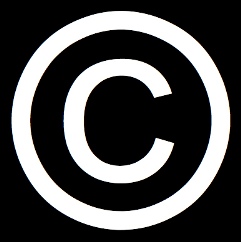One of the greatest things about copyright law in Canada is that you do not have to use a logo, brand or symbol – like the ©.
That’s good, because the use of a logo, brand or symbol may put you in violation of copyright.

This copyright symbol is used through the Creative Commons, which licenses a range of protections and freedoms for authors, artists, and educators.
That’s just one example of the rather circular logic and myth-making that pervades our copyright laws, discussions and understandings.
You may recall that over the summer, Parliament passed a newly-amended Copyright Act (aka Bill C-11); it was supposed to deal head-on with some of our most popular digital media and technology-related activities, like copying music or downloading movies.
So, you’d think our sense of copyright would be clear and concise.
It’s true that the Act addresses lots of consumer tech issues, and it’s true that consumer interests may be better protected as a result.
In most cases, the new rules say we can legally make a copy of some music or a movie we purchased, and have the back-up for our own use. It is true for the most part that students and teachers may not have to face onerous copyright fees for photocopying a few pages of an assigned textbook.
And no, it appears we will not have to pay a copyright royalty ‘tax’ on blank microSD cards.
But, while the country’s Copyright Modernization Act was passed by Parliament at the end of June, the amendments have not yet come into force.
That doesn’t happen with any law until it is fixed by an Order in Council, a legal and administrative procedure triggered by the Governor in Council (our federal Cabinet).
That had not yet happened when Parliament recessed for the summer, and although the Members are now reconvened, no specific word on the timetable has been announced.
Canadian copyright lawyer, author and educator Lesley Ellen Harris confirmed that the new Act won’t be in effect until that formal ‘fixing’, although she noted that even then, its full force may not be in effect:
“Hopefully, we will hear about an order in council soon,” she said, adding that under such an order, “the provisions could all become effective at the same time or at different times.”
Harris publishes an online portal for copyright related news and information, and she has followed the course of the Canadian legislation for several years – well, the Act was first passed in 1924, and has never been fully re-written, so her insightful coverage extends back as far as her website, registered in 1998.
Harris pointed out that, because the Order has not yet been given, the “old” Act is still in effect.
Also last summer, the country’s Supreme Court handed down several high profile copyright-related decisions, but as Harris added, they are only “‘effective’ in terms of interpreting the old Act.”
In one case, the Court ruled that the previewing songs online before purchasing is not eligible for copyright considerations (i.e., more money), but the Court did not address a related issue of movie or video previews.
The Court seemed to favour educators over copyright holders in the use of photocopied materials for school purposes in another case; however, the Court actually sent the case back to the country’s Copyright Board for consideration or enforcement.
In announcing the new copyright regime, the federal government stressed that the rights of consumers were carefully considered and protected.

Our use of digital gadgets, including accessories like this MicroSD card, are covered in the Copyright Modernization Act.
It pointed specifically to the use of microSD memory cards, those used in smartphones, cell phones and other such digital media gadgets.
The Canadian Private Copying Collective (CPCC) had demanded that such fees to be levied; in fact, it wants the existing levy on blank CDs — currently 29 cents each — to be continued at that rate through 2013.
But the government says no; consumers will not face the additional costs for storing stuff (even copyright protected stuff) on a smart card that they do face with an optical disc.
Canada’s copyright law amendments were years in the making, as mentioned.
The country has agreed to other rules, such as the World Intellectual Property Organization copyright and Internet treaties that were signed some 15 years ago, but we never aligned our laws with those international agreements.
Other international agreements, such as the new WIPO copyright treaty or rules emerging from the Trans Pacific partnership, could impact how Canada’s laws are implemented or applied.
Even more confusing and controversial, our copyright laws may be trumped by corporate interests.
The new law does let a consumer make a personal copy of music or other legally purchased media content for personal use only.
But if that media is protected by a ‘digital lock’ that’s installed by the rights holder or manufacturer, then by-passing that lock or ‘hacking it’ leaves you open to copyright violation.
So, while the country lets you can make a copy, the manufacturer may not.

Enduring symbols of Canada, such as this government-provided photo of Parliament, also have certain copyright protections.
So Canada does have its new Copyright Modernization Act, and that is an achievement after all this time.
But the copyright waters remain muddied and unclear.
-30-
story submitted by Lee Rickwood



